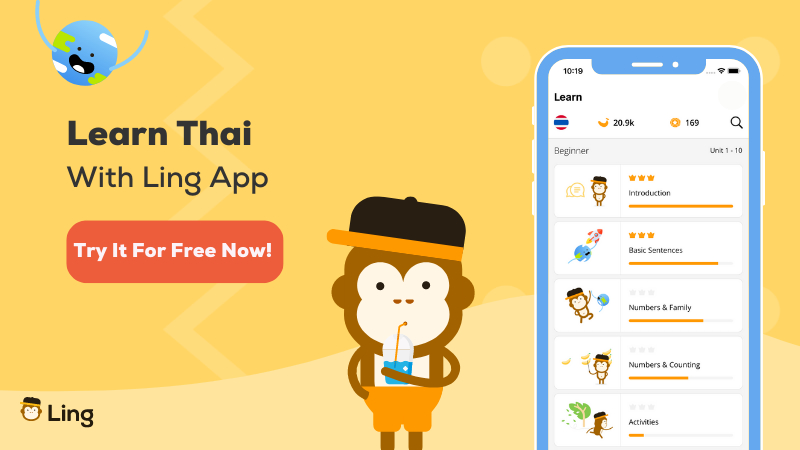Thailand is a country with a rich and diverse culture, but what truly sets it apart is its deep-rooted belief in respecting others. Showing reverence to elders and those in positions of power is an essential part of their social practices. So, if visiting Thailand is on your bucket list, then learning some polite Thai phrases is an absolute must!
When you think of the “Land of Smiles,” what country comes to mind? That title belongs to Thailand, where visitors are greeted by warm and welcoming locals who are always ready with a friendly smile and the use of wai. It’s no wonder that the Thai people have a reputation for being some of the friendliest in the world!
In fact, the “Thai smile” is a unique aspect of the country’s culture. It’s not just a simple expression of happiness – it’s a way of communicating and showing goodwill. Whether you’re ordering food at a street vendor or asking for directions, a smile can go a long way in establishing a connection and making a new friend.
Are you wondering if there are simple Thai phrases you can use to show respect to the locals in Thailand? Absolutely! In this post, we’re not only going to explore the fascinating customs of this beautiful country, but we’re also going to give you some useful Thai phrases to make your stay even more enjoyable. Let’s begin!
Important Polite Thai Phrases You Need To Know
Before going through an in-depth lesson on these basic Thai phrases, you need to know the particles kha (ค่ะ) and khap (ครับ). Female speakers typically use kha at the end of sentences or after asking questions, while khap is utilized by male speakers. These two Thai words are convenient if you want to be polite with someone you’ve just met or if you’re speaking to someone from a high position or an older adult. Now that you’ve learned this, proceeding to learn some polite Thai phrases would be a piece of cake!

1. Sawatdee (สวัสดี)
This word is one of the most basic greetings in Thai. It translated to “hello” in English, but its meaning is not limited to this word alone. Sawadee also means goodness, safety, and prosperity in the Thai language. Given its rich definition, you may even use this to bid people goodbye. Plus, here’s another fun fact about this word: it has been used by the local people since January 22, 1943! How amazing is that?
2. Khop Khun Ka/Khap (ขอบคุณค่ะ/ครับ)
Like in any other culture, “thank you” is generally used to show politeness and respect towards another person. In the Thai culture, gratitude, kindness, and respect are highly valued. So, if you ever receive something or they did anything nice for you, saying ขอบคุณ is well-appreciated.
3. Chai Yo (ไชโย)
Are you celebrating something with your friends? It’s often part of celebrations to clink your glasses and cheer for your success or just be simply happy over a celebration. But did you know that in Thailand, Thai people believe that clinking glasses bring good luck?
4. Sabai Dee Mai (สบายดี ไหม)
There are plenty of ways to begin a conversation with someone, and typically, people use “how are you?” to begin a good talk. To respond to this query, you may say “sabai dee ka/khap“, meaning “I’m fine.” However, if you’re not feeling well, you may reply mai sabai, which translates to “not well.” Saying this phrase means that you’re not physically well.
5. Khor Thot (ขอโทษ)
We’ve all been there – accidentally bumping into someone or saying something that wasn’t quite right. But don’t worry, in Thailand, and there’s a simple and effective way to make things right: apologizing. The Thai word for sorry is “ขอโทษ” or khor thot, which is a powerful tool for expressing your regrets and making amends.
However, it’s worth noting that Thai people don’t like to apologize, as it may cause them to “lose face.” That’s why it’s essential to approach the situation with sensitivity and respect, showing that you understand and genuinely regret the impact of your actions.
6. Mai Pen Rai (ไม่เป็นไร)
This phrase translates to “don’t worry” or “it’s okay.” Generally, this expression shows a laid-back attitude; simply saying that it’s not a big deal and they don’t have to sweat it. It’s also another way to politely say “you’re welcome” and decline an offer.
7. Mai Dai (ไม่ได้) And Dai (ได้)
These terms are one of the many words that travelers can use when visiting Thailand. Mai dai translates to “can not”, while dai means “can.” This is particularly handy when you’re in the busy streets of the country, and you’ll receive questions if you can speak Thai or not.
8. Yin Dee Dtôn Ráp (ยินดีต้อนรับ)
Have you ever heard a Thai person say yin dee dtôn ráp the moment you enter their home? This sentence is a great icebreaker, showing their hospitality towards their guests. It means “it’s a pleasure to have you come in” or simply saying “welcome” in English.
9. Mai Chai (ไม่ใช่) and Chai (ใช่)
The most basic Thai words that a tourist must learn to say are “yes” and “no.” However, you must also know different tones when you learn Thai. The word “no” directly translates to mai in Thai, but plainly saying it this way can be quite rude. It’s ideal to say mai chai (not yes) to a local, while if you want to say “yes,” you can just respond chai.
Learn Thai With Ling
Did you have a blast mastering these essential phrases in the Thai language? As we learned in this post, knowing how to speak a few Thai words and polite phrases can help you forge deeper connections with the locals and enrich your travel experience. While it’s true that English is also widely spoken in cities like Bangkok, there’s nothing quite like being able to converse in their mother tongue and show off your newfound language skills.
Feeling intimidated by the Thai language? Don’t worry – you’re not alone! Thai can be a challenging language to learn, but fortunately, there’s a fun and interactive way to master it. With Ling, you’ll learn Thai and other languages that pique your interest. Plus, you’ll get to explore different cultures and traditions along the way, making your language-learning journey all the more exciting and meaningful.
Ling is available on your mobile devices but can also be accessed via the web. Aside from its in-depth lessons, a free account will offer unlimited access to educational games, challenging quizzes, and an advanced chatbot that can speak multiple languages. Ready to give it a try? Download Ling now for FREE on Play Store and App Store!






















